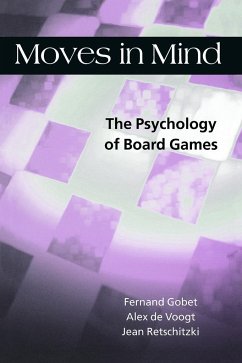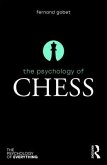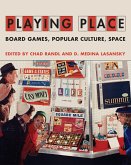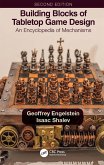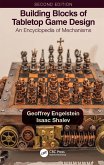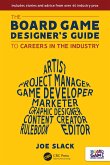- Broschiertes Buch
- Merkliste
- Auf die Merkliste
- Bewerten Bewerten
- Teilen
- Produkt teilen
- Produkterinnerung
- Produkterinnerung
This book, which is the first systematic study of psychology and board games, covers topics such as perception, memory, problem solving and decision making, development, intelligence, emotions, motivation, education, and neuroscience.
Andere Kunden interessierten sich auch für
![The Psychology of Chess The Psychology of Chess]() Fernand GobetThe Psychology of Chess20,99 €
Fernand GobetThe Psychology of Chess20,99 €![Thematic Integration in Board Game Design Thematic Integration in Board Game Design]() Sarah ShippThematic Integration in Board Game Design51,99 €
Sarah ShippThematic Integration in Board Game Design51,99 €![Playing Place Playing Place]() Chad RandlPlaying Place40,99 €
Chad RandlPlaying Place40,99 €![Characteristics of Games Characteristics of Games]() George Skaff EliasCharacteristics of Games54,99 €
George Skaff EliasCharacteristics of Games54,99 €![Building Blocks of Tabletop Game Design Building Blocks of Tabletop Game Design]() Geoffrey EngelsteinBuilding Blocks of Tabletop Game Design70,99 €
Geoffrey EngelsteinBuilding Blocks of Tabletop Game Design70,99 €![Building Blocks of Tabletop Game Design Building Blocks of Tabletop Game Design]() Geoffrey EngelsteinBuilding Blocks of Tabletop Game Design163,99 €
Geoffrey EngelsteinBuilding Blocks of Tabletop Game Design163,99 €![The Board Game Designer's Guide to Careers in the Industry The Board Game Designer's Guide to Careers in the Industry]() Joe SlackThe Board Game Designer's Guide to Careers in the Industry48,99 €
Joe SlackThe Board Game Designer's Guide to Careers in the Industry48,99 €-
-
-
This book, which is the first systematic study of psychology and board games, covers topics such as perception, memory, problem solving and decision making, development, intelligence, emotions, motivation, education, and neuroscience.
Hinweis: Dieser Artikel kann nur an eine deutsche Lieferadresse ausgeliefert werden.
Hinweis: Dieser Artikel kann nur an eine deutsche Lieferadresse ausgeliefert werden.
Produktdetails
- Produktdetails
- Verlag: Taylor & Francis Ltd
- Seitenzahl: 288
- Erscheinungstermin: 22. Oktober 2012
- Englisch
- Abmessung: 234mm x 156mm x 16mm
- Gewicht: 448g
- ISBN-13: 9780415655651
- ISBN-10: 041565565X
- Artikelnr.: 36541396
- Herstellerkennzeichnung
- Libri GmbH
- Europaallee 1
- 36244 Bad Hersfeld
- gpsr@libri.de
- Verlag: Taylor & Francis Ltd
- Seitenzahl: 288
- Erscheinungstermin: 22. Oktober 2012
- Englisch
- Abmessung: 234mm x 156mm x 16mm
- Gewicht: 448g
- ISBN-13: 9780415655651
- ISBN-10: 041565565X
- Artikelnr.: 36541396
- Herstellerkennzeichnung
- Libri GmbH
- Europaallee 1
- 36244 Bad Hersfeld
- gpsr@libri.de
Ferdnand Gobet is Professor of Psychology at Brunel University, West London. He is an International Master of the International Chess Federation and has played for several years with the Swiss national team. Alex de Voogt is at the University of Leiden and Managing Editor of the journal Board Game Studies. Jean Retschitzki is Professor of Psychology at the University of Fribourg. He was elected as President of the Swiss Society of Psychology in 1998
Part 1: Introduction.Moves in Mind. Board Games and Cognitive Psychology.
The Role of Board Games in Science. The Role of Board Games in Psychology.
Structure of the Book. Part 2: Formal Analyses of Board Games. Fundamental
Concepts. Board Games in Computer Science and Artificial Intelligence.
Information and Complexity Analysis. Game Theory and the Concept of Error.
Conclusion. Part 3: Theories of Board-game Psychology. A Brief History of
Board-game Psychology. Theories of Chess Skill. Influences from Other
Theories of Cognition. Theories of Development and Environment. Conclusion.
Part 4: Perception and Categorization. Low-level Perception. High-level
Perception and Categorization. Conclusion. Part 5: Memory, Knowledge, and
Representations. Memory for Board Positions. Recall of Sequences of Moves
and of Games. Estimation of the Number of Chunks in LTM. Mode of
Representation. Representations Used in Blindfold Playing. Knowledge and
Memory Schemata. Discussion. Conclusion. Part 6: Problem Solving and
Decision Making. Empirical Data on Search Behaviour. Empirical Data on the
Role of Perception in Problem Solving. Empirical Data on the Role of
Knowledge in Problem Solving. Analogy Formation in Novice Players.
Theoretical Accounts. Discussion. Conclusion. Part 7: Learning, Development
and Ageing. Early Stages of Learning. Development of Play and Game
Behaviour. Developmental Studies of Specific Board Games. Ageing.
Conclusion. Part 8: Education and Training. Introduction. Board Game
Instruction and the Transfer of Skill. Teaching the Rules and Basic
Instruction. Training and Coaching at an Advanced Level. Conclusion. Part
9: Individual Differences and the Neuropsychology of Talent.Intelligence
and Visuo-spatial Abilities. Personality. Emotions and Motivation. Board
Games and Neuroscience. Overall Conclusion. Part 10: Methodology and
Research Designs. Definitions of Expertise. Game Specificity. Illiterate
Games. Ecological Validity. Cross-cultural Aspects. The Creation and Use of
Archives and Databases. Observations and Natural Experiments. Interviews
and Questionnaires. Introspection and Retrospection. Protocol Analysis.
Standard Experimental Manipulations. Neuroscientific Approaches. Typical
Research Designs. Mathematical and Computational Modelling. Weaknesses and
Strengths of Methodologies Used in Board-game Research. Part 11:
Conclusion. Board Game Complexity. Landscape of Board Games. Impact of
Board-game Research. Future. References. Appendix 1: Rules of Board Games.
Appendix 2: Measures of Expertise in Board Games. Appendix 3: Example of
Protocol Analysis.
The Role of Board Games in Science. The Role of Board Games in Psychology.
Structure of the Book. Part 2: Formal Analyses of Board Games. Fundamental
Concepts. Board Games in Computer Science and Artificial Intelligence.
Information and Complexity Analysis. Game Theory and the Concept of Error.
Conclusion. Part 3: Theories of Board-game Psychology. A Brief History of
Board-game Psychology. Theories of Chess Skill. Influences from Other
Theories of Cognition. Theories of Development and Environment. Conclusion.
Part 4: Perception and Categorization. Low-level Perception. High-level
Perception and Categorization. Conclusion. Part 5: Memory, Knowledge, and
Representations. Memory for Board Positions. Recall of Sequences of Moves
and of Games. Estimation of the Number of Chunks in LTM. Mode of
Representation. Representations Used in Blindfold Playing. Knowledge and
Memory Schemata. Discussion. Conclusion. Part 6: Problem Solving and
Decision Making. Empirical Data on Search Behaviour. Empirical Data on the
Role of Perception in Problem Solving. Empirical Data on the Role of
Knowledge in Problem Solving. Analogy Formation in Novice Players.
Theoretical Accounts. Discussion. Conclusion. Part 7: Learning, Development
and Ageing. Early Stages of Learning. Development of Play and Game
Behaviour. Developmental Studies of Specific Board Games. Ageing.
Conclusion. Part 8: Education and Training. Introduction. Board Game
Instruction and the Transfer of Skill. Teaching the Rules and Basic
Instruction. Training and Coaching at an Advanced Level. Conclusion. Part
9: Individual Differences and the Neuropsychology of Talent.Intelligence
and Visuo-spatial Abilities. Personality. Emotions and Motivation. Board
Games and Neuroscience. Overall Conclusion. Part 10: Methodology and
Research Designs. Definitions of Expertise. Game Specificity. Illiterate
Games. Ecological Validity. Cross-cultural Aspects. The Creation and Use of
Archives and Databases. Observations and Natural Experiments. Interviews
and Questionnaires. Introspection and Retrospection. Protocol Analysis.
Standard Experimental Manipulations. Neuroscientific Approaches. Typical
Research Designs. Mathematical and Computational Modelling. Weaknesses and
Strengths of Methodologies Used in Board-game Research. Part 11:
Conclusion. Board Game Complexity. Landscape of Board Games. Impact of
Board-game Research. Future. References. Appendix 1: Rules of Board Games.
Appendix 2: Measures of Expertise in Board Games. Appendix 3: Example of
Protocol Analysis.
Part 1: Introduction.Moves in Mind. Board Games and Cognitive Psychology.
The Role of Board Games in Science. The Role of Board Games in Psychology.
Structure of the Book. Part 2: Formal Analyses of Board Games. Fundamental
Concepts. Board Games in Computer Science and Artificial Intelligence.
Information and Complexity Analysis. Game Theory and the Concept of Error.
Conclusion. Part 3: Theories of Board-game Psychology. A Brief History of
Board-game Psychology. Theories of Chess Skill. Influences from Other
Theories of Cognition. Theories of Development and Environment. Conclusion.
Part 4: Perception and Categorization. Low-level Perception. High-level
Perception and Categorization. Conclusion. Part 5: Memory, Knowledge, and
Representations. Memory for Board Positions. Recall of Sequences of Moves
and of Games. Estimation of the Number of Chunks in LTM. Mode of
Representation. Representations Used in Blindfold Playing. Knowledge and
Memory Schemata. Discussion. Conclusion. Part 6: Problem Solving and
Decision Making. Empirical Data on Search Behaviour. Empirical Data on the
Role of Perception in Problem Solving. Empirical Data on the Role of
Knowledge in Problem Solving. Analogy Formation in Novice Players.
Theoretical Accounts. Discussion. Conclusion. Part 7: Learning, Development
and Ageing. Early Stages of Learning. Development of Play and Game
Behaviour. Developmental Studies of Specific Board Games. Ageing.
Conclusion. Part 8: Education and Training. Introduction. Board Game
Instruction and the Transfer of Skill. Teaching the Rules and Basic
Instruction. Training and Coaching at an Advanced Level. Conclusion. Part
9: Individual Differences and the Neuropsychology of Talent.Intelligence
and Visuo-spatial Abilities. Personality. Emotions and Motivation. Board
Games and Neuroscience. Overall Conclusion. Part 10: Methodology and
Research Designs. Definitions of Expertise. Game Specificity. Illiterate
Games. Ecological Validity. Cross-cultural Aspects. The Creation and Use of
Archives and Databases. Observations and Natural Experiments. Interviews
and Questionnaires. Introspection and Retrospection. Protocol Analysis.
Standard Experimental Manipulations. Neuroscientific Approaches. Typical
Research Designs. Mathematical and Computational Modelling. Weaknesses and
Strengths of Methodologies Used in Board-game Research. Part 11:
Conclusion. Board Game Complexity. Landscape of Board Games. Impact of
Board-game Research. Future. References. Appendix 1: Rules of Board Games.
Appendix 2: Measures of Expertise in Board Games. Appendix 3: Example of
Protocol Analysis.
The Role of Board Games in Science. The Role of Board Games in Psychology.
Structure of the Book. Part 2: Formal Analyses of Board Games. Fundamental
Concepts. Board Games in Computer Science and Artificial Intelligence.
Information and Complexity Analysis. Game Theory and the Concept of Error.
Conclusion. Part 3: Theories of Board-game Psychology. A Brief History of
Board-game Psychology. Theories of Chess Skill. Influences from Other
Theories of Cognition. Theories of Development and Environment. Conclusion.
Part 4: Perception and Categorization. Low-level Perception. High-level
Perception and Categorization. Conclusion. Part 5: Memory, Knowledge, and
Representations. Memory for Board Positions. Recall of Sequences of Moves
and of Games. Estimation of the Number of Chunks in LTM. Mode of
Representation. Representations Used in Blindfold Playing. Knowledge and
Memory Schemata. Discussion. Conclusion. Part 6: Problem Solving and
Decision Making. Empirical Data on Search Behaviour. Empirical Data on the
Role of Perception in Problem Solving. Empirical Data on the Role of
Knowledge in Problem Solving. Analogy Formation in Novice Players.
Theoretical Accounts. Discussion. Conclusion. Part 7: Learning, Development
and Ageing. Early Stages of Learning. Development of Play and Game
Behaviour. Developmental Studies of Specific Board Games. Ageing.
Conclusion. Part 8: Education and Training. Introduction. Board Game
Instruction and the Transfer of Skill. Teaching the Rules and Basic
Instruction. Training and Coaching at an Advanced Level. Conclusion. Part
9: Individual Differences and the Neuropsychology of Talent.Intelligence
and Visuo-spatial Abilities. Personality. Emotions and Motivation. Board
Games and Neuroscience. Overall Conclusion. Part 10: Methodology and
Research Designs. Definitions of Expertise. Game Specificity. Illiterate
Games. Ecological Validity. Cross-cultural Aspects. The Creation and Use of
Archives and Databases. Observations and Natural Experiments. Interviews
and Questionnaires. Introspection and Retrospection. Protocol Analysis.
Standard Experimental Manipulations. Neuroscientific Approaches. Typical
Research Designs. Mathematical and Computational Modelling. Weaknesses and
Strengths of Methodologies Used in Board-game Research. Part 11:
Conclusion. Board Game Complexity. Landscape of Board Games. Impact of
Board-game Research. Future. References. Appendix 1: Rules of Board Games.
Appendix 2: Measures of Expertise in Board Games. Appendix 3: Example of
Protocol Analysis.

